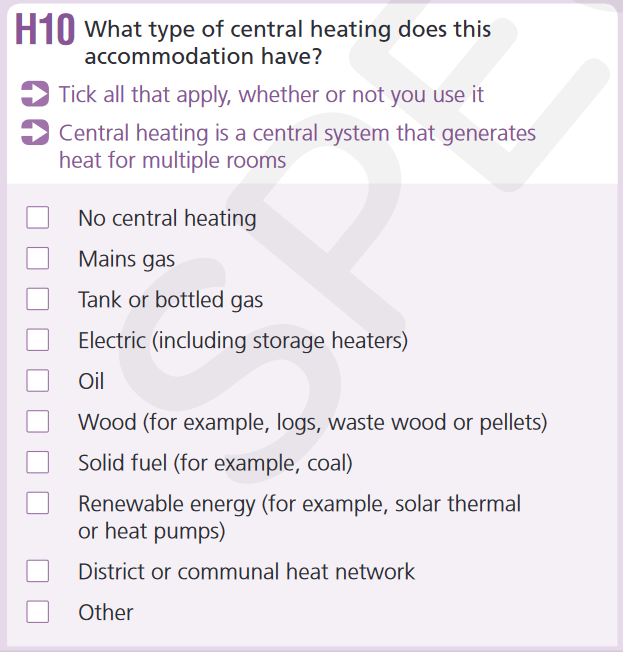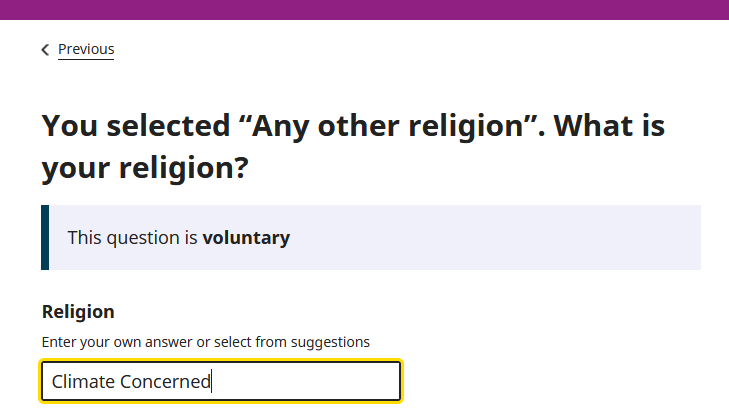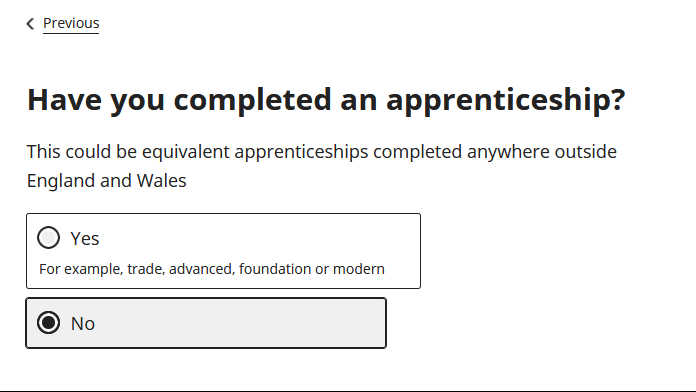Before I start, all my education work via the Geogramblings’ “Life Geographic” blog is done all in my spare time, at my own cost but is free for you to access and enjoy. If you can spare a few pence, I’d be delighted if you could show your thanks by ‘buying me a coffee‘. Thank you!
Happy UK Census Day everyone!

Before I go geography-geek bouncy on you all, I know that the UK census or any census for that matter is far from perfect. This year’s census has been particularly controversial due to the inclusion of optional questions on sexual orientation and gender identity. I won’t elaborate more here, instead I recommend you read my previous post on that issue, particularly as it is something that is deeply personal to me. That post also acts as a good preamble to this one anyway. Check it out!
My household completed the census a few days ago. You don’t have to complete it on the 21st March, so long as when you do, you answer prospectively – that is what your circumstances will be on the 21st March. This is to ensure an accurate-as-possible snapshot of the country at a given time. There are pros-and-cons to this approach; the biggest limitation being that it only happens, currently, once every 10 years. A lot can happen in that amount of time (crickey, I’m a case-in-point!) and there is an argument to shorten the return period. More on that later.
I won’t go over trodden ground about what the census is, and why it’s important. Here are a few references for you, and then I’ll crack on with my analysis.
- Richard Harris, Professor of Quantitative Social Geography from the University of Bristol has been covering the census a fair bit on his blog. This post is a good summary of what it is and why it’s important.
- The official Census website itself has put together an education section, aimed at secondary schools. There you can find resources, a teacher’s toolkit and videoes such as this:
My take on the census
This is the second time that the census can be completed online, not just in paper format. This makes it far more accessible because as time has gone on, the information that the census collects has become increasingly detailed and complex. You can request a paper copy, and despite it being a beast of over 30 pages, it’s strangly a thing of beauty. Well, for data, demography and geography geeks like me.

This illustrates why I’m not going to go through every question. But instead, opine on a small handful, giving thoughts I had when I was completing this myself. I’ll take them in order that they cropped up! First off, a household question:

This question has been on the census for a while, but it’s the first time that ‘renewable energy’ and ‘communal heat network’ makes an appearence. We ticked ‘mains gas’ and ‘electric’ and ‘renewable energy’, the latter two because surplus from our solar PV panels activates our immersion heater. Effectively we store energy as solar heated hot water. Surprisingly, there was no question about electricity supply. I thought that if government were serious in fast-tracking our domestic electricity supply towards a more greener set-up, then they would want to at least start tracking how homes are powering themselves. Maybe it’s because such data is available from other sources, such as the Feed-In Tariff register. Still, a localised snapshot of areas in need of more renewable sources of energy would help with better planning.
Now onto the personal questions:

This is the first time ever that this question has been asked in the census, since the Marriage (Same Sex Couples) Act only came into play in 2013 after decades of campaigning. It’s a step in the right direction to ensure ‘non-traditional’ partnerships are represented, but my partner and I struggled with this question given my identity. So work needs to be done before it can give a completely accurate and representative picture.

There is an option to self-describe your ‘national identity’. Even national identity can be so complex and intersectional, so it is good that this option is available. You need to opt to answering in this manner, however, by selecting ‘other’ (the options were ‘British’, ‘English’, ‘Welsh’, ‘Scottish’ and ‘Northern Irish’). That’s quiet a rigid and somewhat nationalistic take on something that can be core to many people. I answed ‘European’ for two reasons. Firstly, I was born in 1982 as a citizen of the European Union. I’ve therefore been European since birth and as someone who finds beauty, connection, community and joy in connecting with people outside of my ‘tribe’, I feel way more European than I do English or even British. Therefore it is accurate for me to answer this question as such. Secondly, as a legitimate form of protest, that I had my European citizenship taken away without consent. Elaborating on that is for another time…
Using the census as a platform for protest is nothing new. Perhaps the most famous is the boycott of the 1911 census by the suffragette movement. This Guardian piece is a fantastic visual overview of the history of the census including when it was centered in acts of protest.

When the data comes out, this is going to be particularly fascinating. For a while now, the UK has a trend towards increasing secularism. Fewer people in the UK describe themselves in religious – and, I could be wrong here, but I think that this question is now volunatary rather than compulsory. If I’m right, then I think that’s a clear indication of the afforementioned trend. Indeed, the question is not taken as seriously as it might have been in the past, if the ‘Jedi Knight’ craze was anything to go by! I myself am an aethist (also call myself a ‘lapsed catholic’!), but this time, a second piece of activism is to write ‘Climate Concerned’ as my religion. Ok, being ‘Climate Concerned’ isn’t a religion – I see the irony in that, don’t worry! But the question is voluntary and a ‘best fit’ place to write in this sentiment. I don’t think this campaign gained as much traction as the ‘European’ one mentioned before. But we’ll see.

I won’t go into too much detail here. Hopefully you’ve already read my previous blog article about this. If not, now’s the time to quickly pop-over and read for context. It felt so so good to fill out this question, but when I did so, I had the feeling that it’s still rather limited. Given that gender is not binary (or even a spectrum – I like to think of it as a ‘galaxy’ with gravitational centers), then having a free-form text box to answer this question is going to be tricky when it comes to data analysis. I entered ‘trans non-binary (demi-girl)’ – so what does that get categorised into? Transgender? Non-binary? Demi-girl!!? And that’s the crux of the problem – more boxes, more categorisation. But, at least, the fact that I was able to click ‘no’ to not identifying as the sex registered at birth is a massive leap forward and will yield useful demographic information that should finally see gender non-confirming people as real, here, and in need of services and support as much as anyone else. There have been valid concerns that closeted LGBTQ+ people will not be able to disclose their sexual orientation or gender identity accurately on the census, since one member of the household can fill it in on behalf of others. However, any individual who feels that the person completing their household’s census is misrepresenting them, then they can ask for individual access without the knowledge of said person. To what extent the people who need to know this will know, or can act on this, is another matter.
Ok, last one…

This is a brand new question and it perked my interest because of my day-job with the University of East Anglia to support disadvantaged students into accessing higher education. One pathway into, and through, higher education are apprenticeships. Since the government have been putting in quite a substantial amount of money into supporting education and training through apprenticeships, I imagine they are keen to collect data on their uptake and outcomes of it. As I’ve learnt more about apprenticeships for my day-job, I have to say that they are a fantastic opportunity and there are exciting things ahead, particularly with opportunities in the green sector and digital economy. The ‘traditional’ university route should not be seen as the only option, nor the ‘gold standard’ for our youngsters.
Census 2021 and the Coronavirus
One of my favourite people when it comes to demography is Professor Danny Dorling. He’s been very vocal about the concerns he has regarding the current circumstances of the pandemic skewing the data that may come out of the 2021 Census. I strongly recommend you read his thoughts over on his blog, or via this Guardian article laying out the case for a census in five rather than ten years time. You can also listen to Danny talk to RT UK News here:
Your feedback is important
At the end of the process, you are encouraged to give your feedback. And you most certainly take the opportunity to do so. Perhaps you agree with Danny Dorling about the timing of the next census? Say so! For me, this is the first census that I felt that I could be truly represented, and so it was important for me to feed that back.
Thank you! All my education work via the Geogramblings’ “Life Geographic” blog is done all in my spare time, at my own cost but is free for you to access and enjoy. If you can spare a few pence, I’d be delighted if you could show your thanks by ‘buying me a coffee‘.
Citing this post
APA: Rackley, K. (2021, March 21). Census Day 2021 [Blog post]. Retrieved from https://geogramblings.com/2021/03/21/census-day-2021/
MLA: Rackley, Kit. “Census Day 2021”. Geogramblings. 21 Mar. 2021, https://geogramblings.com/2021/03/21/census-day-2021/.
Harvard: Rackley, K. (2021). Census Day 2021 [Online]. Geogramblings. Available at: https://geogramblings.com/2021/03/21/census-day-2021/ (Accessed: day month year)


One thought on “Census Day 2021”